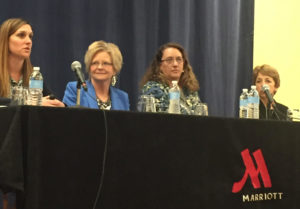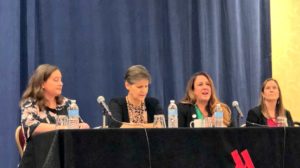Advance CTE reflects on sessions and activities at the Advance CTE Fall Meeting held earlier this week in Baltimore, Maryland. Learn more about sessions you may have missed in this series.
Moving Beyond a Seat at the Table
This year’s Fall Meeting included a session called, “Moving Beyond a Seat at the Table: Advancing CTE Through  Partnerships and Collaboration” on how state leaders in Career Technical Education (CTE) can build meaningful relationships. Kate Kreamer, Deputy Executive Director of Advance CTE, moderated this session, and encouraged the room to be intentional when building partnerships and evaluate not just the strength of the relationship but also the value.
Partnerships and Collaboration” on how state leaders in Career Technical Education (CTE) can build meaningful relationships. Kate Kreamer, Deputy Executive Director of Advance CTE, moderated this session, and encouraged the room to be intentional when building partnerships and evaluate not just the strength of the relationship but also the value.
There were many good points from the panelists, but one that I found particularly compelling was the push to consider whether there are mutual benefits coming out of a partnership. As CTE increasingly gains national traction, leaders in the area are being pulled into a variety of conversations. However, the panelists encouraged us to consider whether we are being included in order to “check a box,” or whether we are gaining anything substantive from each other.
I found the push to consider what we can bring to the table in a partnership, and what type of role our partner can play for our own goals, to be especially valuable. Quality of engagement, instead of quantity, is something that we can all consider as we continue on in our own work.
Meredith Hills, Policy Associate
Equity in CTE
Since I’ve joined Advance CTE’s team in March 2018, equity in CTE has been a constant topic in the office. Advance CTE has reached out to state leaders as well as partner organizations to learn about how we may help state leaders advance equity in CTE. It was exciting to share some of our findings from this outreach with our members during the Building Trust to Ensure Equity in CTE session at Fall Meeting.
The session allowed our members to learn about how Wisconsin is using policy levers to advance equity in CTE for historically marginalized populations and how Oklahoma is promoting a culture in the state agency and teacher workforce that values equity through diversity and inclusion trainings. I’m excited to use the questions and comments from session participants to inform Advance CTE’s future equity briefs.
Brianna McCain, Policy Associate
Discussing Data and Funding at the Fall Meeting
Here are two topics that don’t often get a lot of attention: data and funding. All too often states are constrained by resources,  capacity, funding and policy from making any real progress on either front, leaving these two very important issues to take a back seat to more pressing concerns. But all that is beginning to change. In 2017, funding was the number one policy priority across the states – and that’s during a year in which 49 states and Washington, DC collectively passed more than 240 CTE-related policies. The federal government has also increased funding for CTE through the Fiscal Year 2018 and FY 2019 budgets. And with Perkins V implementation on the horizon, states are starting to think very seriously about restructuring their data systems to meet more rigorous expectations for data collection and reporting.
capacity, funding and policy from making any real progress on either front, leaving these two very important issues to take a back seat to more pressing concerns. But all that is beginning to change. In 2017, funding was the number one policy priority across the states – and that’s during a year in which 49 states and Washington, DC collectively passed more than 240 CTE-related policies. The federal government has also increased funding for CTE through the Fiscal Year 2018 and FY 2019 budgets. And with Perkins V implementation on the horizon, states are starting to think very seriously about restructuring their data systems to meet more rigorous expectations for data collection and reporting.
At the Fall Meeting, attendees had the chance to hear from leading states that are using funding and data to improve outcomes for learners. One of the breakout sessions highlighted Tennessee’s efforts to braid funding across a variety of funding streams including the Perkins reserve fund, the state’s Experienced Professional in the Classroom (EPIC) project to support CTE teacher pathways, and the New Skills for Youth initiative. Participants also heard about the North Carolina Community College system’s tiered funding structure, which is designed to incentivize and support programs in high-demand industries.
During a general plenary about using CTE data, participants got to hear a conversation with State CTE Directors facilitated by Elizabeth Dabney of the Data Quality Campaign. Elizabeth talked about common challenges and policy recommendations for making the most of data by building trust, protecting privacy and, most importantly, measuring what matters. State leaders from Hawaii, Ohio and Texas shared some of their own lessons and strategies for using CTE data.
Austin Estes, Senior Associate, Policy

